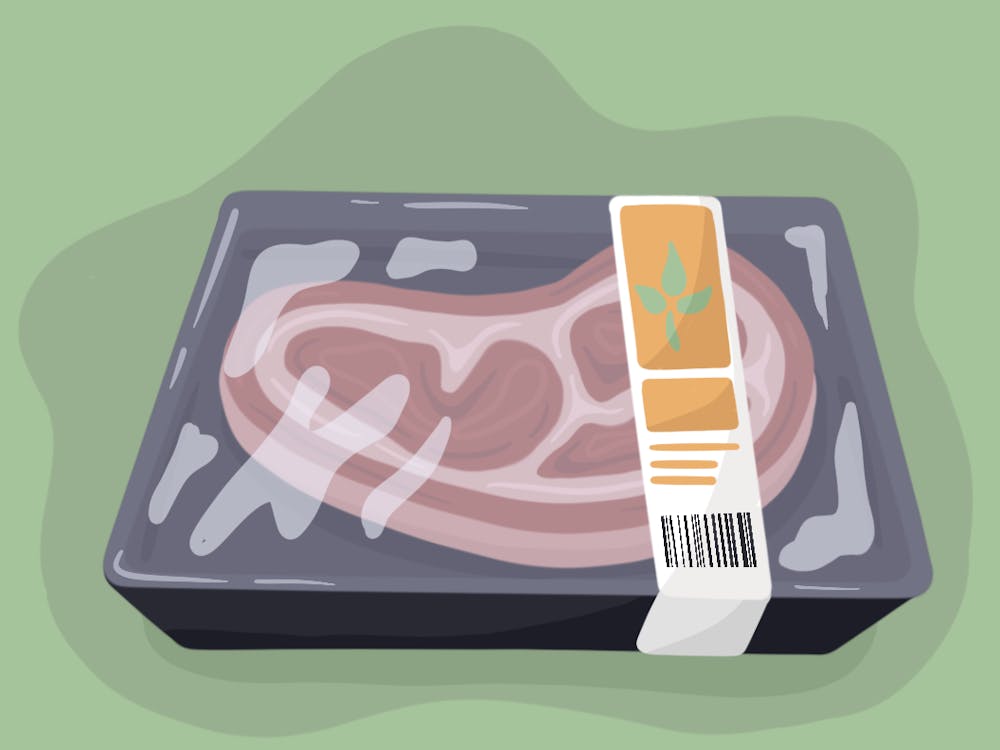After nearly four hours of passionate public debate and multiple reminders for the audience to remain respectful, the Alachua County Board of Commissioners voted 4-1 to advance plans for a meat processing facility in Newberry.
Vegans, animal rights activists and medical professionals turned out at the special meeting Tuesday to oppose the progress of a local $2.5 million facility. The county-owned plant would process roughly 75 animals weekly.
In support were small-scale farmers and ranchers who argued the benefits of having a low-cost, ethical meat-packing plant in the neighborhood.
When the floor opened for public comment, about 20 people sprung up to speak. On one side of the room were ranchers in cowboy hats, and on the other, animal-rights advocates in “Vegan is Love” caps.
The majority of speakers sided with the latter and aired concerns about the ethics of meat consumption in general.
Public commenters included Shannon Blair and her son Evan from Melbourne, Florida, who sported “Plant Based Treaty” T-shirts.
“The process of raising and killing animals for food is never humane and often involves practices such as confinement, mutilation and painful stunning and killing methods,” Shannon Blair said.
Blair and her son were also part of an organized protest outside of the meeting auditorium, consisting of about a dozen activists donning signs and plant-based graphic T-shirts.
Commissioner Ken Cornell, the sole vote against the proposal, argued the real issue is not the ethics of meat consumption, but how the facility should be funded.
“I don’t view this as meat eaters vs. non-meat eaters,” Cornell said. “I just don’t. I view this as public dollars vs. not public dollars.”
Because the county has yet to find an operator for the proposed facility, he’s weary to move forward, he said. Among other concerns was the lack of clarity around public opinion, especially among the residents of Newberry, where the facility would be located.
“Newberry hasn’t even had a meeting with the citizens of Newberry,” Cornell said.
Commissioners Marihelen Wheeler and Anna Prizzia agreed with Cornell that the county shouldn’t run the facility.
However, they differed from Cornell in their view that it was a necessary step for small-scale ranchers to process their meat locally and cost-effectively — especially as the industry continues to shrink due to competition with large-scale ranches.
Commissioner Prizzia was a vegetarian for 15 years and sympathized with many points raised by opponents of the proposed facility, she said.
“A lot of what was said today was true. Our industrial meat system is broken,” Prizzia said. “As a meat eater now, I want to be able to eat meat that I know is raised well and is contributing to our community, our local economy and protecting our local ranchers.”
Speaking in support of those local ranchers was John Nix, a fourth-generation cattle rancher in eastern Alachua. To have a USDA-approved facility process his meat locally would be a financial relief for his ranch of roughly 40 cattle, he said.
One of the top concerns among ranchers is having to transport their animals out of the county and even the state to be processed, resulting in high transportation costs and more CO2 emissions.
Without those added costs, Nix would increase his profits by 30% to 40%, he said.
But it’s not just his own livelihood that Nix and ranchers like him are worried about. Rather, a local meat processing plant would reduce costs for the next generations, Nix said.
“They are not going to work on farmland they can’t make money on,” he said. “I think by adding this economic structure and by bringing it closer to the consumer, it would allow the next generation to take over a lot of our farmland that we’re losing.”
Also in support of the proposal was Amy Van Scoik, the co-founder of Frog Song Organics, a farm of both produce and livestock.
“The animals are a fraction of what we do. We basically raise animals to grow tons of vegetables,” Van Scoik in an interview. “And vegans are a big part of our customer base.”
A smaller, local facility would also allow Van Scoik to know her animals were treated properly when they were sent in to be processed, she said.
Another topic that resurfaced was the facility’s potential impact on the environment. At the beginning of the meeting, officials from the Environmental Protection Department tried to clear up rumors about contamination at the facility’s proposed location.
EPD Director Stephen Hofstetter explained that the site used to be a crop duster airstrip and during the 1980s contained unsafe levels of toxic chemicals in the soil. The site has since been evaluated and determined clean, though the EPD wants to continue testing to ensure it’s safe.
Aside from ethical, economic and environmental concerns, the health effects of meat consumption were what drove registered dietician nutritionist Noah Praamsma to speak.
Praamsma travels the country with the Physicians Committee for Responsible Medicine, a non-profit, plant-based diet advocacy group, to argue the negative impact on health from eating meat.
Based on studies showing red and processed meat contribute to heart disease, the proposed meat processing facility would be counter-productive, Praamsma said.
“Clearly this money that’s being proposed for this slaughterhouse is a great opportunity for local investment,” he said in an interview. “But investing it in meat is detrimental to human health, and there’s so many better options for where that money could go.”
Redirecting the facility’s funds to instead transition ranchers from livestock to produce was a recurring suggestion during public comment.
Early in the meeting, Commissioner Mary Alford asked rancher John Nix if he would consider repurposing his land to grow crops.
“Most of the cattlemen have taken a long time to set these pastures up. These aren’t things that happen overnight,” he said. “So, transitioning to a food-based vs. an animal-based operation wouldn’t sit for many cattlemen.”
By the end of the night, much was left unresolved about the future of the meat processing plant: who its operator would be, how residents of Newberry felt about it and whether people should eat meat in general. But what’s certain is there will be months of deliberation to come.
Contact Jack at jlemnus@alligator.org. Follow him on Twitter @JackLemnus.
Jack Lemnus is a fourth-year journalism major and rural Alachua reporter. He loves to practice his Spanish, fill his bookshelves and gatekeep what he considers underground music.






